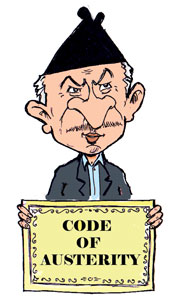 DIWAKAR CHETTRI |
A cross-section of Nepalis we spoke to on a swing through central Nepal this week were unanimous in their support for Baburam Bhattarai. After months of paralyzing deadlock, there is hope that the new prime minister's intellect and integrity will help unknot the hopelessly tangled politics.
Ordinary Nepalis are clutching at straws. This positive perception of Bhattarai, even by those not traditionally well-disposed to the Maoist party, stems from a feeling that desperate times call for desperate measures. Most are willing to overlook the lack of transparency in the four-point agreement with the Madhesi front that allowed Bhattarai to be propelled to Singha Darbar. They brush aside the Maoist support for the Madhes autonomy proposal as politically expedient, and they are even willing to ignore the clause on the general amnesty to those accused of wartime atrocities. This desire to see Bhattarai succeed has prompted many activist wallahs to soft-pedal the agreement that made him prime minister.
But the international community has now taken serious note of the amnesty clause. Undeterred, the new Maoist-appointed Attorney General Mukti Pradhan has made an outrageous statement that all murder cases against Maoist leaders from the war years will be dismissed.
The NC and UML, after initially promising to behave themselves in the role of a constructive opposition seem to have developed a deep distrust of Maoist motives. Within the Maoist party, the gloves have come off with Baidya faction now openly talking of a showdown at the central committee meeting on Monday that will decide on whether or not to officially split off. The talk of revolt now is of a revolt within the party.
With all this going on, the people's expectations on one beleaguered prime minister may be unrealistically high. Bhattarai himself has fed these expectations by working 20 hours a day, getting to work in Singha Darbar while the gates are still locked, and getting his secretary to act on the 1,000 emails he gets every day. Although the public is responding favourably to the crackdown on food adulteration, the prime minister's relief package is somewhat populist and it is questionable whether curbing organized crime should come under "emergency relief".
The statement by Gopal Kirati this week about floating a movement of Bahun Chhetris is a dangerously cynical attempt to exploit a further polarisation of Nepali society. Kirati is so close to Pushpa Kamal Dahal that he staged a noisy demonstration against the lack of Janajati representation in the previous cabinet at the behest of his boss. Which leads us to the conclusion that Dahal is now worried that his party may have pushed too far with ethnic politics and this may cost him votes in the next elections because a large chunk of "high" caste voters feel alienated. This is his clumsy attempt at protecting the caste flank, but it seriously risks driving a wedge in Nepal's social fabric between Bahun Chhetris vs the rest.
The prime minister, as vice-chairman of his party, and a PhD will not have to be told about what a dangerous game this is. While he keeps one eye on the current crises, Bhattarai may have to devote some of his waking hours to the seeds of long-term discord that are being laid by his own comrades.
Read also:
Where justice is a game, ANURAG ACHARYA
Perpetrators of war crimes often assume power to use their positions to escape prosecution


